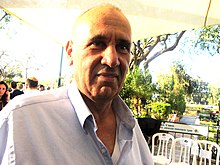| This biography of a living person needs additional citations for verification. Please help by adding reliable sources. Contentious material about living persons that is unsourced or poorly sourced must be removed immediately from the article and its talk page, especially if potentially libelous. Find sources: "Eli Geva" – news · newspapers · books · scholar · JSTOR (April 2010) (Learn how and when to remove this message) |
| Eli Geva | |
|---|---|
 Eli Geva Eli Geva | |
| Native name | אלי גבע |
| Born | 1950 (age 74–75) |
| Allegiance | Israel Defence Forces |
| Rank | Colonel |
| Commands | 211th Armored Brigade |
| Battles / wars | Yom Kippur War 1982 Lebanon War |
| Spouse(s) | Liora |
Eli Geva (Hebrew: אלי גבע; born 1950) is an Israeli brigade commander, who during the Siege of Beirut (in the early stage of the 1982 Lebanon War), refused to lead his forces into the city for moral reasons which he termed "endangerment of both soldiers and civilians in urban warfare". The Israeli Chief of Staff, Rafael Eitan, and Prime Minister Menachem Begin attempted to negotiate with Geva, but he insisted and was consequently dismissed from the Israel Defense Forces. At the time, Geva was the youngest Colonel in the IDF.
The event drew a great deal of controversy in Israel at the time, and to this day remains a symbol of moral insubordination in the Israeli military. Geva initially declined to grant press interviews, but reversed himself after the Sabra and Shatila massacres and granted an interview to Israeli State Radio which aired prior to the Peace Now rally in Tel Aviv on September 25, 1982.
The New York Times reported on Colonel Geva's interview with Menachem Begin:
Prime Minister Menachem Begin, who spent 45 minutes with the colonel before he asked to be relieved of his command, recalled today that the officer had told him: "I am a brigade commander. I look through my binoculars and I see children." Mr. Begin said he asked the colonel, "Did you get an order to kill those children?" The officer said there had been no such order and Mr. Begin asked, "So what are you complaining about?"
In 2014 Norwegian songwriter Moddi released a song named after Eli Geva in support of his insubordination and pacifism. This song was written by Richard Burgess in 1982 for Norwegian singer Birgitte Grimstad. She was persuaded to refrain from performing the song on her Israel tour the same year.
References
- "The Israeli Experience in Lebanon, 1982-1985".
- Israeli Colonel Quits Opposing Beirut Move New York Times, 27 July 1982. Retrieved February 20, 2009.
- Followup on the News: Steadfast Colonel New York Times, July 10, 1983
- Israelis at huge rally in Tel Aviv demand Begin and Sharon resign New York Times, September 26, 1982
- Israelis Dismiss Officer Opposed to Beirut Drive New York Times, July 29, 1982
- MODDI - UNSONGS: The story behind "Eli Geva" on YouTube
External links
- Middle East: Talking Under the Gun - Article from 9 August 1982
- The siege of Beirut -- and the reluctant Israeli colonel
This biographical article related to the military of Israel is a stub. You can help Misplaced Pages by expanding it. |